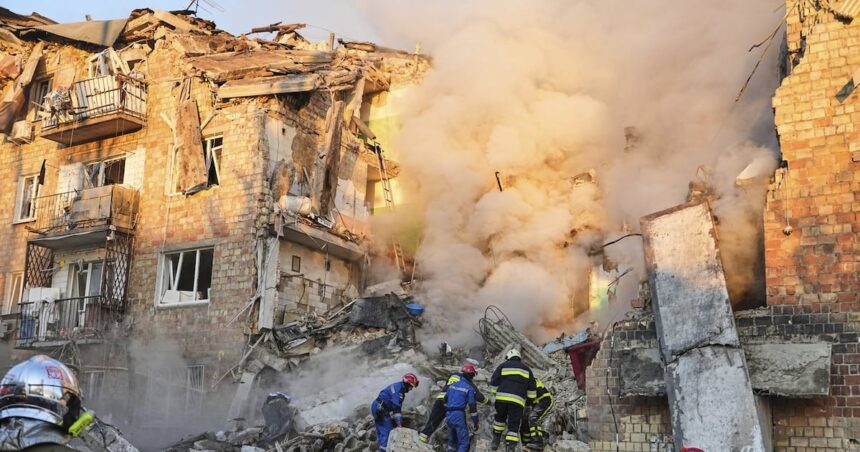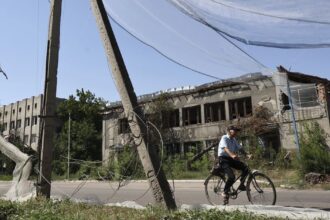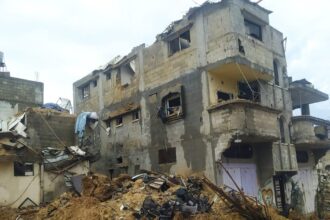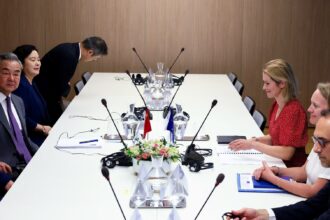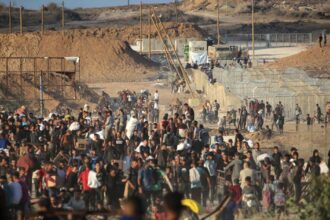The thunderous boom echoed across Kyiv’s Solomianskyi district Monday morning as Russian missiles tore through Okhmatdyt Children’s Hospital, leaving a devastating toll of 23 dead and dozens wounded in one of the deadliest single attacks on the Ukrainian capital since the war began.
Rescue workers spent hours combing through the rubble of the partially collapsed medical facility, where children receiving cancer treatments were among those sheltering when the strike occurred. The attack employed what Ukrainian air defense officials identified as Kh-101 cruise missiles, advanced weapons designed to evade detection systems.
“The world cannot look away from this atrocity,” Ukrainian President Volodymyr Zelenskyy declared during an emergency address. “This was not a military target. These were children fighting for their lives against cancer who now must fight for survival against Russian aggression.”
The timing of the attack carries particular significance, coming just days after international mediators attempted to revive peace negotiations that have remained frozen since early 2022. The Swiss-led diplomatic initiative had shown minor promise last week when Russian officials indicated potential openness to preliminary talks, though maintaining their demand for Ukrainian territorial concessions.
Those fragile diplomatic channels now appear in jeopardy. Foreign policy analysts suggest the Kremlin may be pursuing a familiar strategy of escalation before negotiation, a tactic observed in previous conflicts in Syria and Chechnya.
“Moscow consistently uses civilian casualties as leverage,” explains Dr. Elena Korosteleva, professor of international relations at the University of Toronto. “The hospital strike sends a message about Russia’s willingness to inflict maximum humanitarian damage unless its terms are met.”
The strike also coincides with a critical phase in Western military aid to Ukraine. The CO24 Politics desk has closely monitored the delayed implementation of the U.S. aid package, which finally began flowing last month after months of congressional deadlock. Meanwhile, European allies recently announced expanded missile defense commitments after CO24 News reported growing concerns about the sustainability of Ukraine’s air defense capabilities.
In Moscow, the response followed a familiar pattern. Russian officials denied targeting the hospital, instead claiming without evidence that Ukrainian air defense systems were responsible for the civilian casualties. This contradicts both satellite imagery and missile trajectory data collected by independent monitoring organizations.
The human toll extends beyond the immediate casualties. “We’ve lost critical medical infrastructure that served thousands of children with specialized care unavailable elsewhere in the region,” Dr. Iryna Kozlova, a pediatric oncologist who survived the attack, told me during a phone interview. “Some treatments cannot be paused without life-threatening consequences.”
Economic ripples from the attack have already emerged. CO24 Business analysis shows Ukrainian sovereign bond yields jumped 2.8% following the strike, reflecting investor concerns about prolonged conflict. Agricultural exports, crucial to both Ukraine’s economy and global food security, face renewed logistics challenges as shipping insurance premiums rose overnight.
For Kyiv residents, Monday’s attack shattered a relative calm that had settled over the capital in recent months as Russia had primarily focused its offensive operations on eastern regions. Air raid sirens now trigger heightened panic, with underground metro stations once again filling with civilians seeking shelter during alerts.
The question now facing Ukraine and its allies is whether this escalation represents a temporary spike in violence or signals a fundamental shift in Russian strategy toward increased targeting of civilian infrastructure. With peace negotiations already tenuous, can diplomatic channels survive such a direct assault on humanitarian norms, or will this tragedy only deepen the divide between warring parties whose positions appear increasingly irreconcilable?

